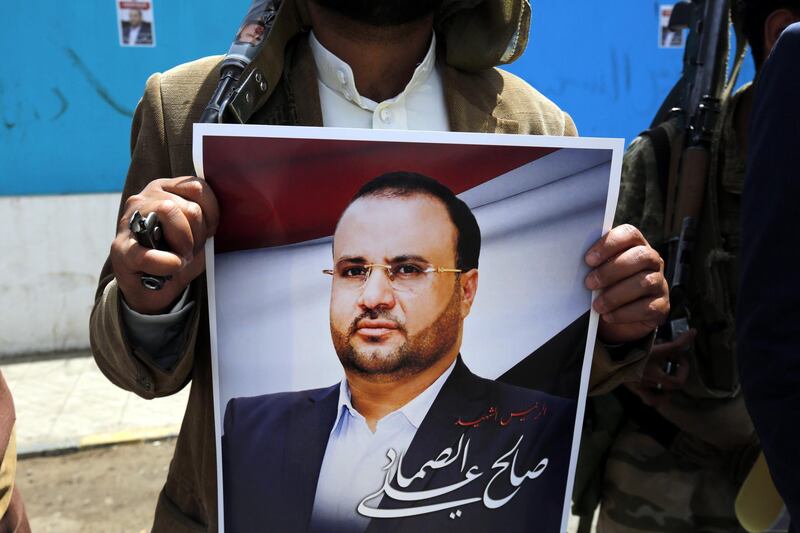An air strike on Yemen's capital by a Saudi-led military coalition has killed dozens of Houthi rebels including at least two commanders, Saudi television reported on Saturday.
Saudi Arabia's official Al Ekhbariya television said two high-ranking insurgents were among more than 50 Houthi militiamen killed in Sanaa on Friday evening.
Saudi-owned Al Arabiya television said a total of 38 rebels were killed in the strike on a Houthi interior ministry building.
The Houthis confirmed an air strike on Sanaa but did not elaborate.
The jets targeted high-ranking Houthi leaders at a headquarters affiliated with the Ministry of Interior in the Yemeni capital, Fares Said, a journalist living in Sana'a told The National, in a phone call.
Senior leaders in the Houthi movement were having a meeting to discuss the preparations for the funeral of Saleh Al Sammad, the president of Yemen's Supreme Political Council, who was killed last week in an air strike carried out by the Arab coalition in the Yemeni port city of Al Hodeidah, Mr Said added.
"Most of the Houthi leaders who were killed were supervisors in the popular committees that were formed by the Houthis as they took over Sana'a in September 2014. But we still have no idea about the number of the leaders killed in the air strike, but we are absolutely sure that a number of high-ranking Houthi leaders of the second line in the Houthi movement were killed last night", he continued.
Al Masirah, a Houthi-run satellite news channel, acknowledged that Houthi leaders met Friday to discuss Saturday's funeral. However, the only air strike Friday night in Sana'a that the outlet reported on involved wounded civilians.
The coalition operation took place as newly-appointed US Secretary of State Mike Pompeo was scheduled to land in Riyadh for meetings, including talks on the Yemen conflict.
It also came as Saudi Arabia on Saturday intercepted four ballistic missiles fired by Yemeni rebels, the Saudi-led coalition against the insurgents said, with a local official reporting one man had been killed in the attack.
The missiles were headed towards the city of Jizan in southern Saudi Arabia, according to a coalition statement.
The Iran-backed rebels have been locked in a war with the Saudi-led military alliance, which since 2015 has fought to restore the internationally-recognised Yemeni government to power.
_____________
Read more:
[ Houthi rebels' No 2 killed in coalition air strike ]
[ The spark in the Houthi coup — Saleh Al Sammad ]
_____________
The raid took place hours before a public funeral for Mr Al Sammad, the Houthis' political head, killed last week in a Saudi-led coalition strike.
Mr Al Sammad, the effective president of the Houthi rebels, had vowed to make 2018 the “year of ballistic missiles” targeting Saudi Arabia before he was killed on Thursday in the western province of Al Hodeidah.
Although he was not a military commander, Al Sammad was integral to the logistics of rebel operations. He was also head of the Houthis’ supreme political council and was crucial to the military propaganda.
On Saturday, the Iran-backed rebels forced thousands of people in Sana'a and the surrounding provinces still under their control to participate in Mr Al Sammad's funeral, Mohammed Ezz, a 37-year-old citizen of Sana'a told The National.
"The government of the Houthi militia sent an order to the schools, the institutions and the Sheikhs in Sana’a city and the other provinces around Sana’a”, Mr Ezz said, “directing them to push students and employees at schools, as well as the residents all over Sana’a and the areas around to attend the funeral of the Houthi leader in Al Sabeen Square Saturday morning in an attempt to show its power. However they know that their power is fake".
The Houthis troubles are not confined to the targeting of its top officials, but also its internal struggles.
"The funeral of the Houthi higher commander – Al-Samad – comes as the Houthi militia experiences unprecedented tensions, especially in Sanaa where Houthi movement leaders started to point fingers accusing each other of Mr Al Sammad’s murder. His son accused high officers in the movement of leaking information about the location where his father exists that enabled the Arab coalition to target him", Ezz added.
Analysts said that selecting Mahdi Al Mashat – who originally comes from the family of Abdulmalik Al Houthi, the leader of the Houthi movement – as a successor for Mr Al Sammad was a clear indication of an underlying conflict within the different arms of the movement.
“Choosing Mr Al Mashat, the manager of the office of Mr Al Houthi, to succeed Mr Al Sammad in the presidency of the supreme council reflects the crisis of trust among the Houthi movement leaders", Yemeni journalist Adel Al Nouzaily, based in Sana’a, wrote in a Twitter post.
"Previously, they tried to transfer their conflict to the General People's Congress party, but the conflict developed to kill the council president and tomorrow it is going to approach to the leader of the militia- Abdulmalik Al-Houthi", Mr Al Nouzaily continued.
The Arab coalition last year named Mr Al Sammad second on a most-wanted list of 40 Houthi rebels. The coalition offered $20 million (Dh73.5m) in return for information on the former Supreme Political Council leader, whose bounty matched that of the Houthi leader, Abdul Malik Al Houthi.
The rebels named Mehdi Hussein Al Mashat as Mr Al Sammad's successor.
Saudi Arabia is leading a coalition, including the UAE, that has been fighting the Houthis in neighbouring Yemen since March 2015 at the request of President Abdrabbuh Mansur Hadi, who had been driven into exile.
Mr Al Sammad made a name for himself in January 2015, when he led a group of armed Houthi militias in the storming of the presidential palace in Sanaa.
He then placed the internationally-recognised president and the prime minister, Khaled Bahah, under house arrest.
The rebel chief demanded then demanded that he be appointed vice president of Yemen, with the intention of eventually usurping Mr Hadi.





